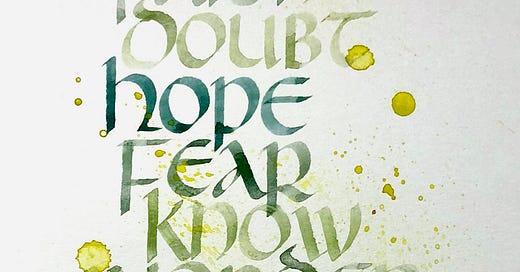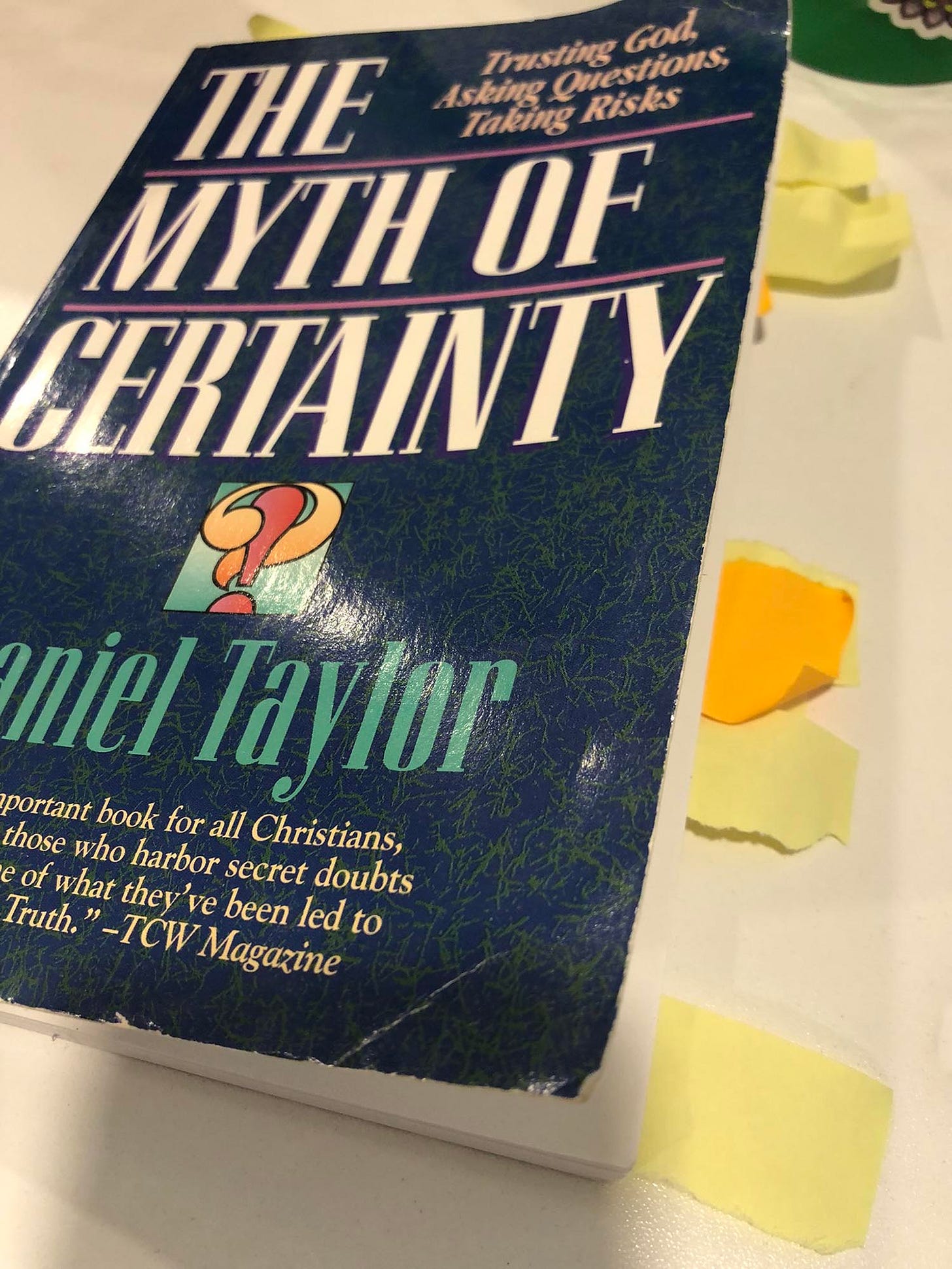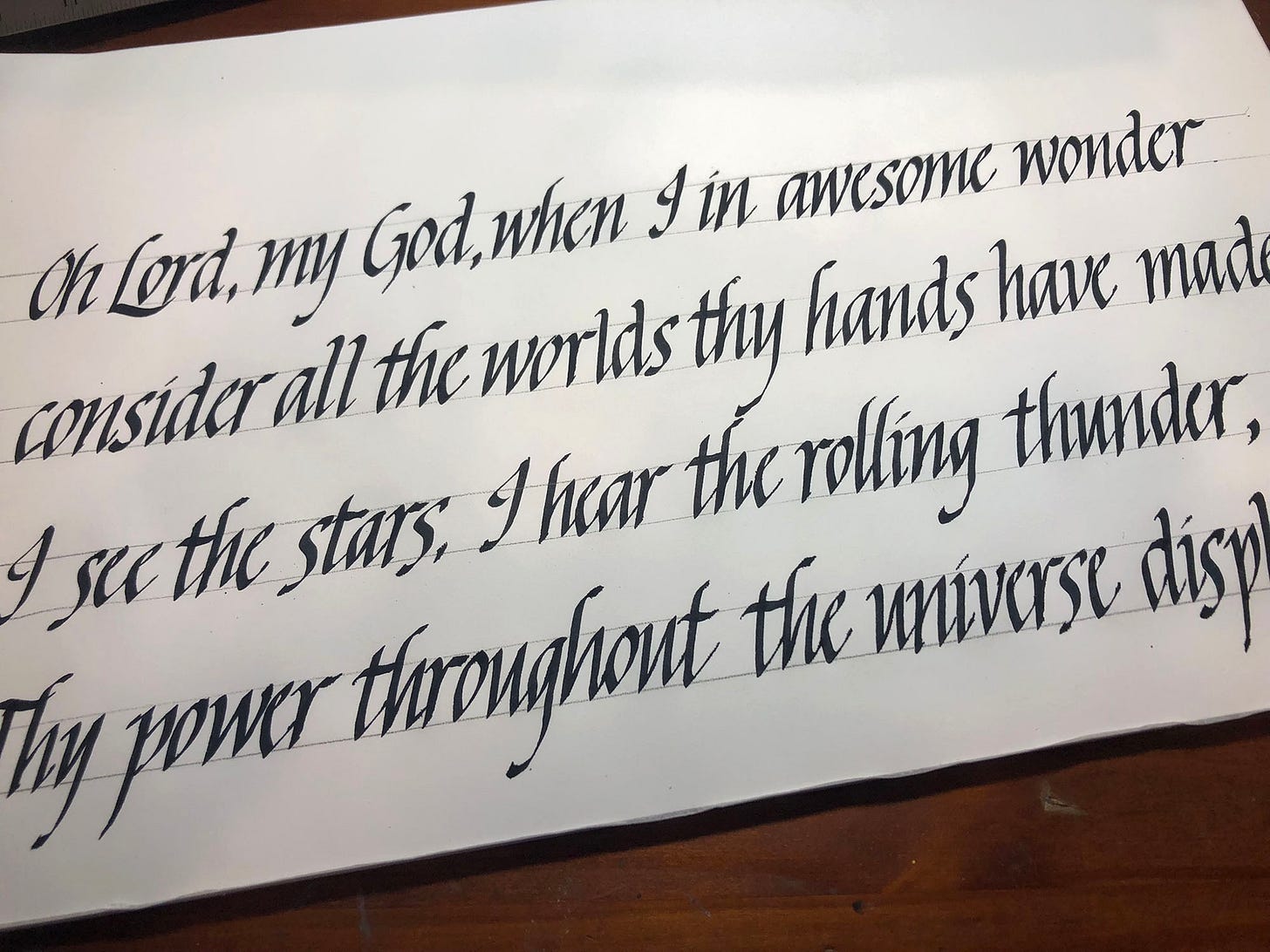Chapter 26: More About Spiritual Uncertainty
Let us therefore not look for certainty and stability. Our reason is always deceived by fickle shadows…” - Blaise Pascal, Pensées, pp. 19-20.
Wisdom begins in wonder. - Socrates
I bought this book from Goodwill about 10 years ago: The Myth of Certainty: Trusting God, Asking Questions, Taking Risks by Daniel Taylor.1
As I was perusing the book section, the title caught my eye. It never occurred to me that uncertainty about my religious beliefs was an option. There is so much emphasis on developing your testimony, bearing your testimony of “what you know” to be true. If you don’t have that, you will falter. And you just need to try a little harder and follow Moroni’s promise so you, too, can know the truth. Sometimes I feel like that leads us to believe that the only way to have a relationship with God and Jesus, the only way we can be worthy to participate fully in the church, is to know. You can’t possibly have a relationship with God if you aren’t certain that Joseph Smith was a prophet, that the Book of Mormon is the word of God, and the only prophet on the earth with the priesthood keys leads the church today.
I purchased the book, and put it on my to-read bookshelf, but I was so subscribed to this idea of certainty for most of my life, that I was afraid of reading the book. Afraid that God didn’t approve. That uncertainty was some kind of anti-Mormon idea. I would glance at it and Righteous Rachel would remind me that I better not read such blasphemous stuff. It sat on my bookshelf for several years, got covered by random piles of stuff, and I just recently found it in a book box again.
I finally read it this week. And I wasn’t struck down. I underlined passages, folded corners of pages and used sticky notes on the really impactful pages.
It gave me a lot to think about.
The author starts by clarifying terms, then writes about reflective Christians, the human need for security, discussing how institutions' primary goal is for self-preservation, the tendency of authoritarianism and the enforcement of rules, reflective Christians in a secular world, and more.
Speaking on the subcultures of intellectual orthodoxy and religious culture:
“My own temperament, mind and experiences unfit me for whole-hearted, unthinking embracing of either, but also make impossible total abandonment of either. I have been touched by God, yet suspect that not everything in the church is of God. Attracted to the beauty, power and understanding available in the secular world of ideas, I see at the same time the inevitable illusions that arise from ignoring the source of all beauty, power and insight.” p. 61
That helped me understand this tug of war going on inside my heart and mind for the past several years. Being caught between two worlds.
And then came Chapter 4: The Search for Truth and Certainty. This chapter had so many insights.
The author writes about the confusion of truth with certainty.
“Even the reflective person often succumbs to the false either-or of institutional belief: “Either you have the certainty about God and His will that we do, or you are possibly not even a believer at all.” As a result, many either try to “believe harder, “ seeking the tranquil unquestioning that seems the ideal, or, out of a sense of confused integrity, sever themselves from the church whose standard they cannot meet.” pg. 79
“Ironically, the insistence on certainty destroys its very possibility. The demand for certainty inevitably creates its opposite - doubt. Doubt derives its greatest strength from those who fear it most. Unwisely glorified as the primary way to truth by many secularists, it is equally unwisely feared by many in Christendom as truth’s mortal enemy.” pg. 80
“T.S Eliot sees a certain kind of doubt as inevitable in matters of faith and correctly suggests that one's attitude toward doubt is more significant that one’s having doubt: “Every man who thinks and lives by thought must have his own skepticism ….that which ends in denial, or that which leads to faith and which is somehow integrated into the faith which transcends it.” The notion of transcending doubt by accepting it into faith, rather than by suppressing it (for it can never be destroyed), is crucial. Perhaps doubt, rather than something to be crushed, can be made to serve faith.
Doubt can only be robbed of its paralyzing and destructive qualities when it is admitted for what it is - which isn’t nearly as much as it appears when not admitted - and is accounted for in the process of faith. Normally doubt is seen as sapping faith’s strength. Why not the reverse? Where there is doubt, faith has its reason for being. Clearly faith is not needed where certainty supposedly exists, but only in situations where double is possible, even present.” pp 80-81
“Might not absolutes be an avenue to certainty and freedom from doubt?” pg. 90 [maybe…]
“One knows something, to be sure, but is it an absolute?” pg. 91
“The notion of absolutes is a human attempt to explain the ways of God to ourselves, (not, by the way, the approach used in biblical revelation), just as our desire for certainty is part of a very human longing for security.” pg. 93
“If you feel you have certainty, I have no desire to convince you otherwise. God bless you in your certainty. But many, like Pascal, have found it incompatible with human experience. …While certainty is beyond our reach, meaning - something far more valuable - is not. Meaning drives from a right relationship with God, based not on certainty and conformity, but on risk and commitment.”pg. 94
“This is our true state; this is what makes us incapable of certain knowledge and of absolute ignorance. We sail within a vast sphere, ever drifting in uncertainty, driven from end to end. When we think to attach ourselves to any point…it wavers and leaves us…Nothing stays for us. This is our natural condition, and yet most contrary to our inclination; we burn with desire to find a solid ground and an ultimate sure foundation whereon to build a tower reaching to the Infinite. But our whole groundwork cracks, and the earth opens to abysses.
Let us therefore not look for certainty and stability. Our reason is always deceived by fickle shadows…” - Blaise Pascal, Pensées, pp. 19-20.
I recently researched more about uncertainty, faith and doubt from some of my favorite spiritual writers. Here are some excerpts from Richard Rohr’s article, Faith and Doubt Are Not Opposites. 2
Basic religious faith is a vote for some coherence, purpose, benevolence, and direction in the universe. Unfortunately, the notion of faith that emerged in the West was much more a rational assent to the truth of certain mental beliefs rather than a calm and hopeful trust that God is inherent in all things, and that this whole thing is going somewhere good.
I worry about “true believers” who cannot carry any doubt or anxiety at all, as Thomas the Apostle and Saint Teresa of Calcutta (1910–1997) learned to do. Doubt and faith are actually correlative terms. People of great faith often suffer bouts of great doubt because they continue to grow. Mother Teresa experienced decades of this kind of doubt, as was revealed after her death. In a letter to a trusted spiritual director she wrote, “Darkness is such that I really do not see — neither with my mind nor with my reason. — The place of God in my soul is blank. — There is no God in me.” [1] The very fact that the world media and people in general were scandalized by this demonstrates how limited is our understanding of the nature of biblical faith.
Author Sue Monk Kidd has written eloquently about the disruption spiritual seekers often encounter in midlife and our resistance to it. She wonders:
What has happened to our ability to dwell in unknowing, to live inside a question and coexist with the tensions of uncertainty? Where is our willingness to incubate pain and let it birth something new? What has happened to patient unfolding, to endurance? These things are what form the ground of waiting. And if you look carefully, you’ll see that they’re also the seedbed of creativity and growth—what allows us to do the daring and to break through to newness. . . .
Creativity flourishes not in certainty but in questions. Growth germinates not in tent dwelling but in upheaval. Yet the seduction is always security rather than venturing, instant knowing rather than deliberate waiting.
My thoughts now on doubt, uncertainty, faith, etc…
We have the human right to say we know something. But we can’t tell someone else that they don’t know what they say they know.
Instead of testifying of what we think are absolute truths, what if instead we say, “I like this doctrine or teaching. It brings me peace and resonates with me. It gives meaning to my life experience.”
What if we stopped being so obsessed with knowing and embraced the beauty of what we don’t know? And just let go of the need to know?
I’m not afraid of uncertainty anymore, but I’m not sure our church likes it.
I feel like because our church leaders have received revelations about certain things - the three kingdoms of heaven, for example, that we only focus on what’s in those revelations and act like that’s the whole truth, that there’s nothing else to know. When in actuality, those revelations give us very little information about the eternities, spirituality, god, etc… Then there is no room for wondering.
I understand that we have a deep human need to define things. To set rules and limits and security. However, I am sick and tired of statements (not just from church leaders) like:
Faith triumphs over fear.
Faith leaves no room for doubt.
Doubt your doubts before you doubt your faith.
The opposite of fear is faith.
The opposite of doubt is certainty.
The opposite of faith is disobedience. Etc…
In my experience, it makes more sense that faith, doubt, certainty, uncertainty, fear are all part of the human experience, especially in a spiritual way. One principle doesn’t necessarily come just after the other, or cause one to be or cause one to disappear. It just is. They don’t need to be feared or demonized.
In the summer of 2021 I was beginning to let go of my tight grasp around certainty. Allowing myself to wonder about spiritual things, to question, wasn’t as scary anymore. I was amazed that letting go of the need to be certain about everything in the church gave me more peace. I felt a mysterious and beautiful wonder about God and life. For a while.
Uncertainty about spiritual things was okay, but later that year I would face a bewildering uncertainty about my marriage and my future that had me gasping for air.
Taylor, Daniel. The Myth of Certainty: Trusting God, Asking Questions. Zondervan Publishing House, 1992.
Rohr, Richard. “Faith & Doubt are Not Opposites. “ Center of Action and Contemplation, February 3, 2021.






